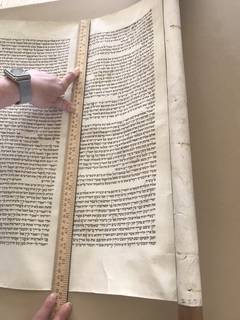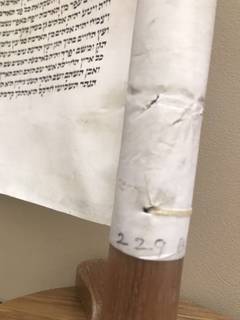Remembering the Holocaust
Kristallnacht
Kristallnacht was the massive campaign of anti-Jewish violence that took place from November 9–10, 1938. Dangerous mobs throughout Germany and Austria freely attacked Jews in the street, in their homes, and at their places of work and worship. Nearly 100 Jews were killed, hundreds more were injured, over 1,000 synagogues were burned, nearly 7,500 Jewish businesses were destroyed, cemeteries and schools were vandalized, and 30,000 Jews were arrested and sent to concentration camps.
Did you know that in Frank Memorial Hall, we have a Torah curtain saved from Kristallnacht (pictured right)? The Torah curtain, still bearing the mark of the flames, was saved from the fire in the street to which the Nazis in Germany had consigned it when they destroyed the synagogues on Kristallnacht, November 9, 1938. It was saved by a young woman who kept it, and in her elderly years left it to the keeping of this congregation. The Torah curtain was donated by Lily and Irving Fallek.
On November 9th, 2023, prior to our Meet Me in a Moment concert beginning, Ralph Samuel shared his family story of escaping Nazi Germany just after Kristallnacht occured.
On Sunday, November 12th, the 5th and 6th grade students of the Goodman Center for Jewish Education gathered for a special Kristallnacht commemoration program. They listened to Dr. Benjamin Garber share his story of escaping Nazi-occupied territory at the young age of eight years old. Additionally, there was a Q&A section for the students at the end of his story.
Yom HaShoah
Yom HaShoah, also known as Holocaust Remembrance Day, occurs on the 27th of the Hebrew month of Nisan, usually April or May.
Yom HaShoah reminds us of the horrors that Jews and other persecuted groups faced: forced labor, starvation, humiliation, and torture, which often resulted in death. It was a systematic effort to wipe out an entire population from the face of the earth.
NSCI’s Shoah Torah
NSCI’s Shoah Torah, MST#229, is from Pardubice and was written c. 1850. Located in the center of East Bohemia, Pardubice (Par-doo-BIT-sa), is now part of the Czech Republic.
Long Journey to NSCI
MST #229 had a long journey from Pardubice to Glencoe, Illinois. During World War II, the Jewish communities of Bohemia and Moravia gathered their Torahs, gold and silver finials, books, and textiles from their devastated synagogues and sent them to the Jewish Museum in Prague in 1942. NSCI’s Shoah Torah was one of 18 Torahs that was transported from Pardubice to Prague along with Judaica from all over the region. Just a few years after the war ended, there was a Communist coup in 1948 which took over, among other things, the Jewish Museum and storage in Prague. With little attention paid to the Jewish artifacts, more than 1,500 Torah scrolls were transferred from the museum to the basement of a warehouse that had once been the sixteenth-century Michle Synagogue.
Forgotten Scrolls
The forgotten Torah scrolls were rescued in 1964 after the Memorial Scrolls Trust was established in England. The Trust was used to purchase the scrolls from the Czech government and bring them to the Westminster Synagogue in London. Here, the Torahs were restored and cataloged. This is when NSCI’s Shoah Torah received the formal designation, MST #229. In 1967, under the leadership of Rabbi Edgar Siskin, NSCI received its Shoah Torah.
Silent Witnesses
The Czech scrolls are survivors and silent witnesses. They represent not only the lost communities of Bohemia and Moravia, but all those who perished in the Shoah. Since its inception, Memorial Scrolls Trust Torahs have been distributed to communities and organizations around the world. The scrolls are never sold or donated, but allocated on loan from MST to be utilized, honored, and cherished.
Memorial Scrolls Trust
To learn more about Memorial Scrolls Trust in London and to view the location of other Shoah Torahs throughout the world, please click HERE.
Find links to our videos of survivor testimonies and past Holocaust remembrance programs, as well as links to Holocaust education and museum resources below.
NSCI Holocaust Survivor Testimonies
Past Events and Conversations
2021 Yom HaShoah Conversation with Sheldon Lazarus of Auschwitz Untold: In Color
To view, click here and enter this code when prompted: tHcsP!clCRs!200!3OCL3A!N
The Aftermath of the Shoah: Life in Poland Today with Professor Paul Liptz
2020 Yom HaShoah Memorial Service
Interview with Professor Samuel D. Kassow on Who Will Write Our History








